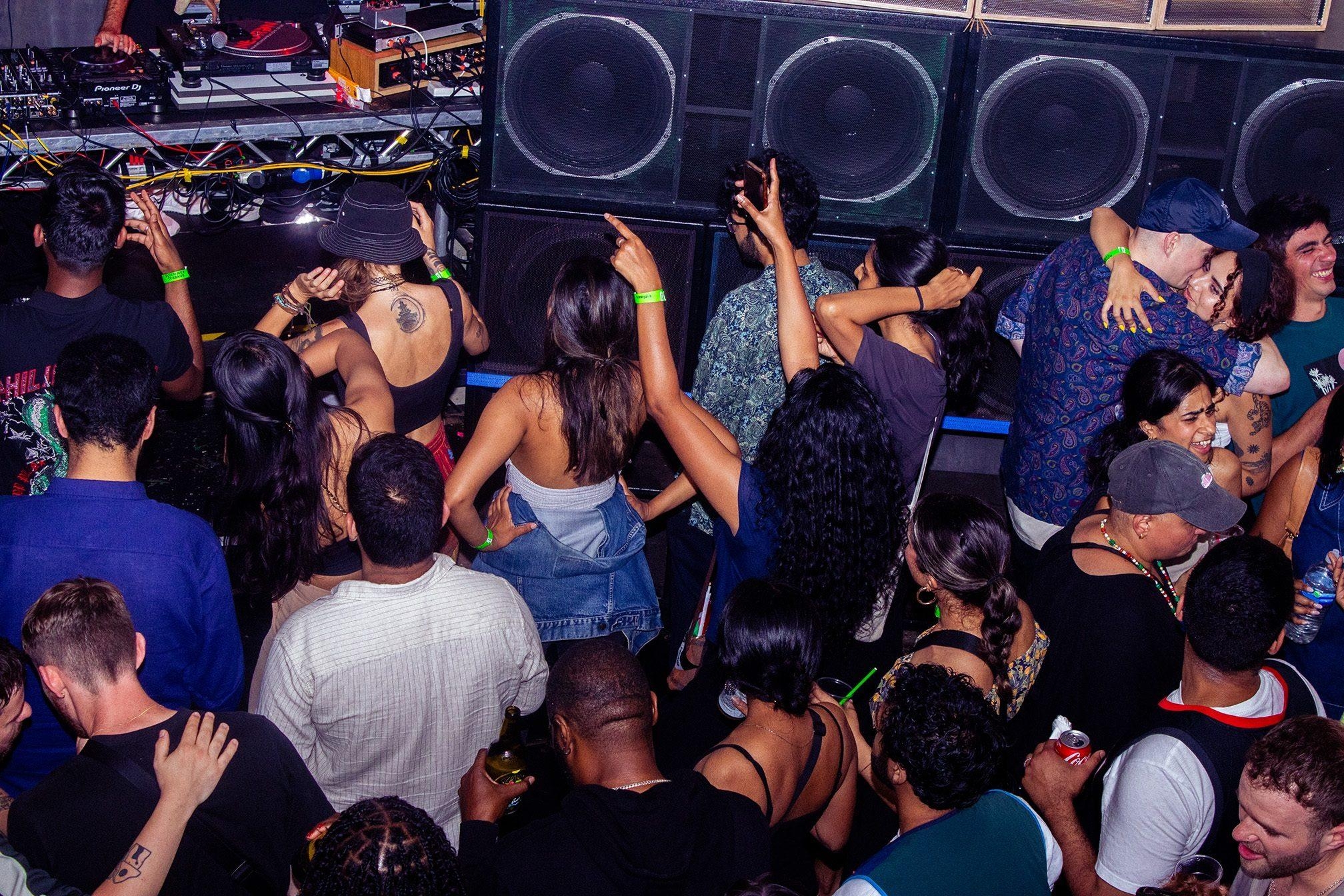 Features
Features
Review: Dialled In's debut in Manchester felt like a beacon of hope against a disturbing political environment
The collective focused on championing South Asian culture have made real progress in improving representation across the industry — and the momentum keeps on building with every invaluable event
From Ahadadream and Priya Ragu’s collaboration with a reborn Skrillex, to the inception of the all-Asian Arrivals stage at Glastonbury, long gone are the days of self-doubt as to my place on the dancefloor, solely driven by the colour of my skin. Now with the debut Manchester edition of Dialled In comes more affirmation that the South Asian diaspora is a major player in electronic music, and here to stay for the long haul.
If you did not know, Dialled In is an artist-led platform showcasing the breadth of South Asian creativity, describing its purpose as “to spotlight and platform the wealth of South Asian artistry by building long-term self-sustainable spaces to ensure our culture is held while it evolves and expands". The necessity for such environments was described by co-founder Dhruva Balram in a recent interview with Crack prior to Glastonbury 2024, in which he called for effective representation across the ‘backbone of the industry’ — not just in reference to DJs and live acts, but also those roles within sound, lighting, conceptual design, and other facets of production and organising. With this, a future for the arts that effectively represents and showcases South Asian artistry is attainable, as the ‘power’ needed to enact and see change often lies here, behind the scenes. With consideration as to the disturbing nature of the British political environment as of recent times - driven purely by xenophobia, racism, and ignorance - concepts and spaces such as Dialled In must continue to be championed and experienced by all, in order to combat current political rhetoric and media portrayal that often looks to demonise people of colour.
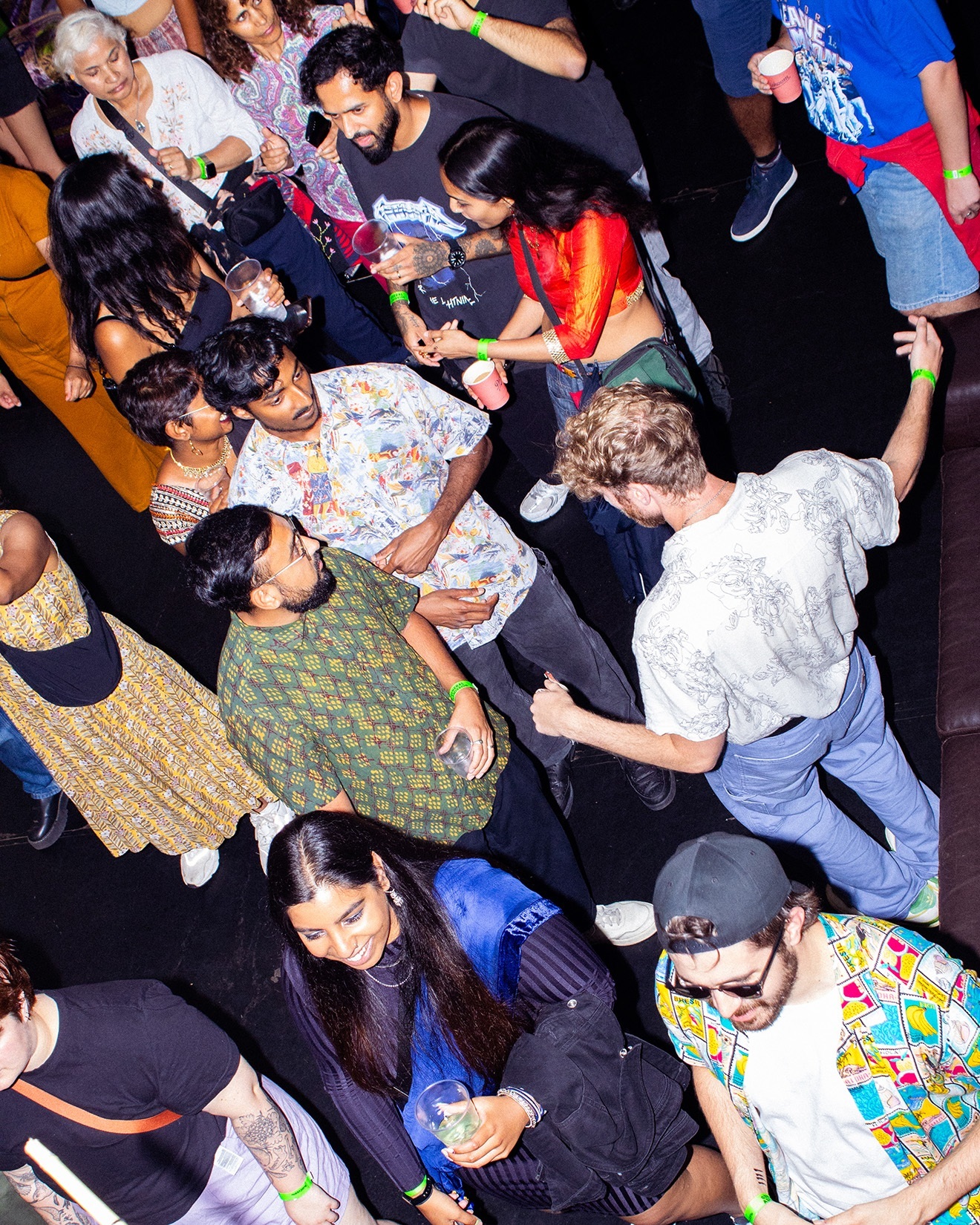
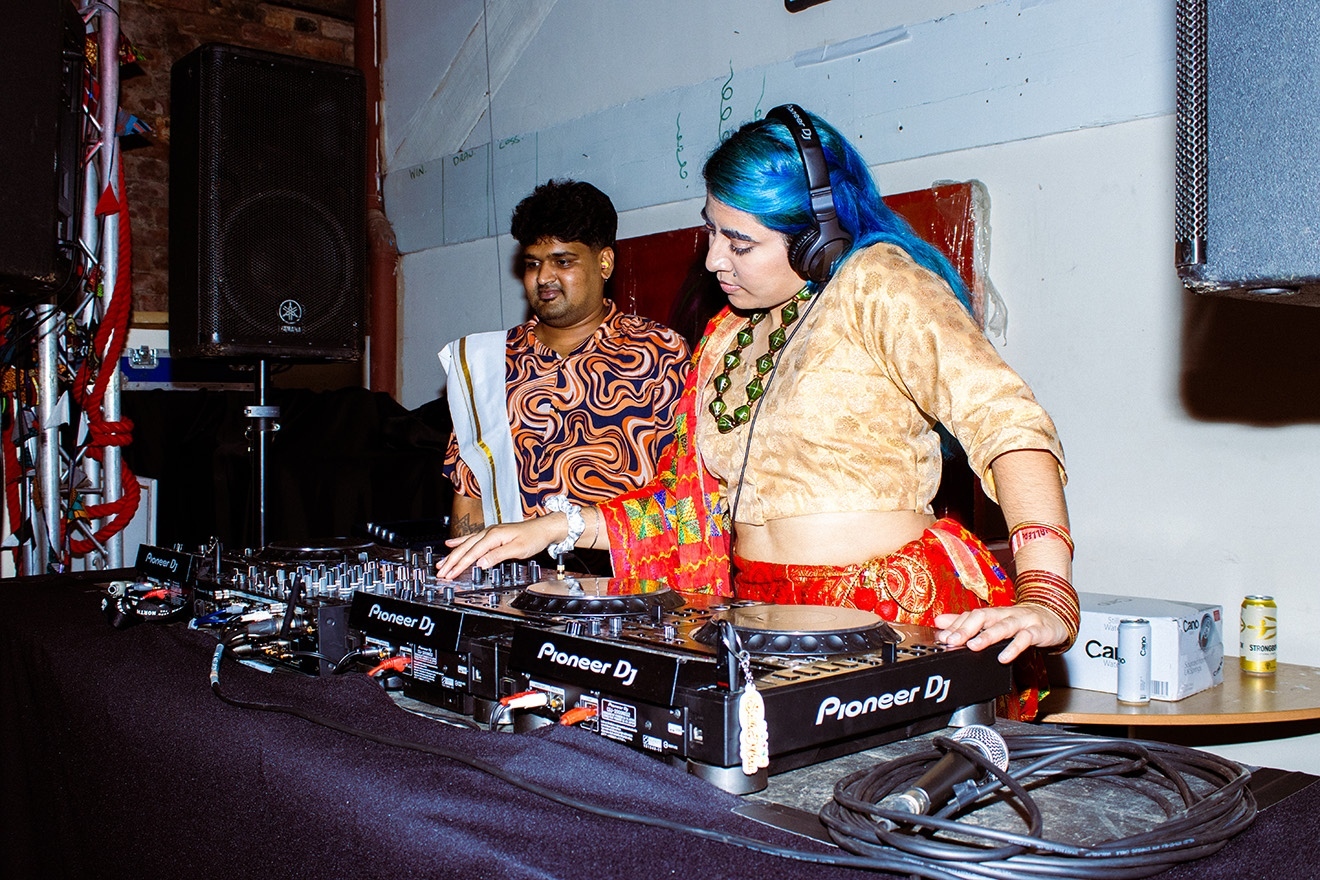
The team behind Dialled In certainly do not just ‘talk the talk’, they have been instrumental in laying down the foundations for the exponential growth and visibility of South Asians within the arts in the UK and further afield. Joining together some of the brightest minds across the diaspora has enabled Dialled In to establish itself as a catalyst for change and a household name within the cultural calendar. Heading into its fifth year, the platform’s achievements speak for themselves — from their instrumental role in Pakistan’s inaugural Boiler Room, to their co-production of Glastonbury’s first-ever South Asian stage, the aforementioned Arrivals. With the Dialled In team telling Mixmag “it’s a priority for us moving forward to include as many people as possible from outside of London”, it may not be long until you see them at a venue near you.
For their debut in Manchester, Dialled In opted for Hulme’s NIAMOS Centre as the setting, a place steeped in tradition and history, with the Grade II listed building offering a perfect layout for a festival looking to incorporate music, knowledge, food and more into one holistic experience. From young families, to general partygoers, or young South Asians looking to reconnect with their heritage, it was a heartening mix of individuals that resulted in an educational and welcoming environment. Vibrant lenghas and pristine kurtas were on display, just to add to the homely feel. Hearing young South Asians explain anything from kulfi, Bhangra, or even the difference between chai tea and normal tea to their peers would put a grin on any South Asian individuals’ face. Dialled In’s long-standing partnership with Dishoom once again struck a chord with attendees, and in addition to Sanskruti and Knight’s BBQ, one could indulge to the peak of their senses. Anyone who knows me well will know that I will shout from the rooftops about my mother’s homemade Indian food — for once, I think she might have been topped.
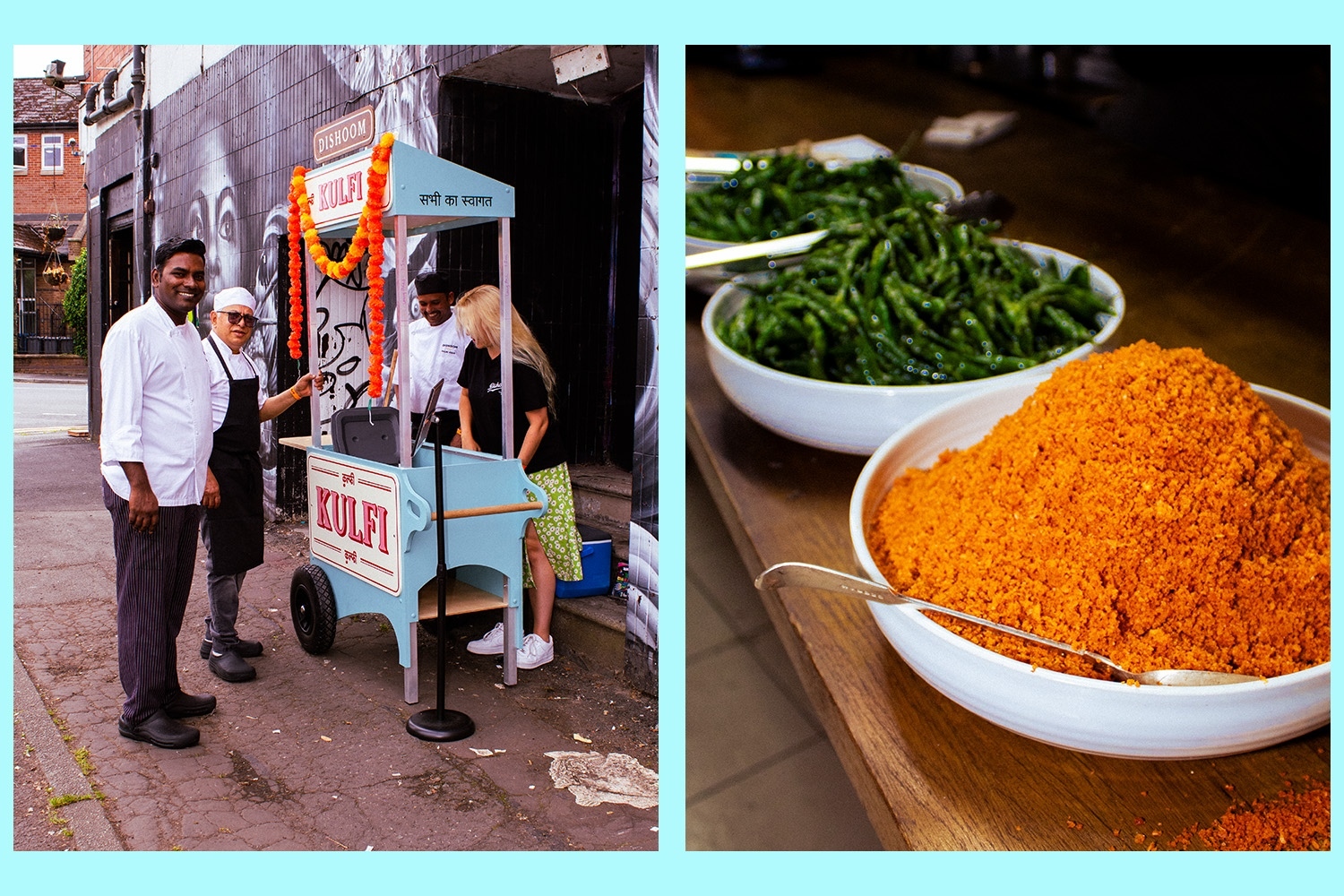
Ahsan-Elahi Shujaat, Dialled-In co-founder and a proud Northerner, led the event with Chandé, Gracie T, and Balraj Samrai in charge of curation. I was brimming with positive anticipation prior to the festival, and there is no doubt that it lived up to expectations.
The Theatre room offered a holistic programme of live performances, conversations, and DJs. The space has previously been utilised by the BBC, and the programming and curation of this room took full advantage of the venue’s theatrical features. The Theatre served as a perfect platform for the beautiful, melancholic atmosphere to start the day, with a personal highlight being Aziz Ibrahim and Dalbir Singh Rattan, known as Aziz & Dal, providing their Asian Blues aesthetic. The self-proclaimed ‘DesiGuitr’ and ‘TablaJedi’ took the theatre on a sonic journey over the duration of their live performance. A serene, but beautiful atmosphere was honed, with a black and white film of South Asians first arriving into the United Kingdom projected behind the duo, with individuals and families in discourse. With free entry for children, it served as a perfect education for the next generation of South Asians within the UK. The ability for them to see someone who looks just like them actively involved and visible in arts will undoubtedly help destroy generations-old stereotypes and expectations on South Asian youth.
Read this next: Into the light: Iyre is uplifting South Asia’s drum ‘n’ bass scene
Simultaneous to the live performances within the Theatre, the programming of the Foyer saw coverage across the sonic spectrum. Little India, more commonly known as the London borough of Southall, helped soundtrack the first few hours. For those who do not know, Southall is home to the largest Punjabi community outside of the Indian subcontinent. With RSP opening proceedings followed by the Vedic Roots crew, spiritual energy was the order of the day as reggae, Bhangra, and dub were shuttled through the spaceship-turned-soundsystem supplied by Vedic Roots. With a full stack – four subs, two double kicks, and four tops – I felt vibrations I never knew were possible before.
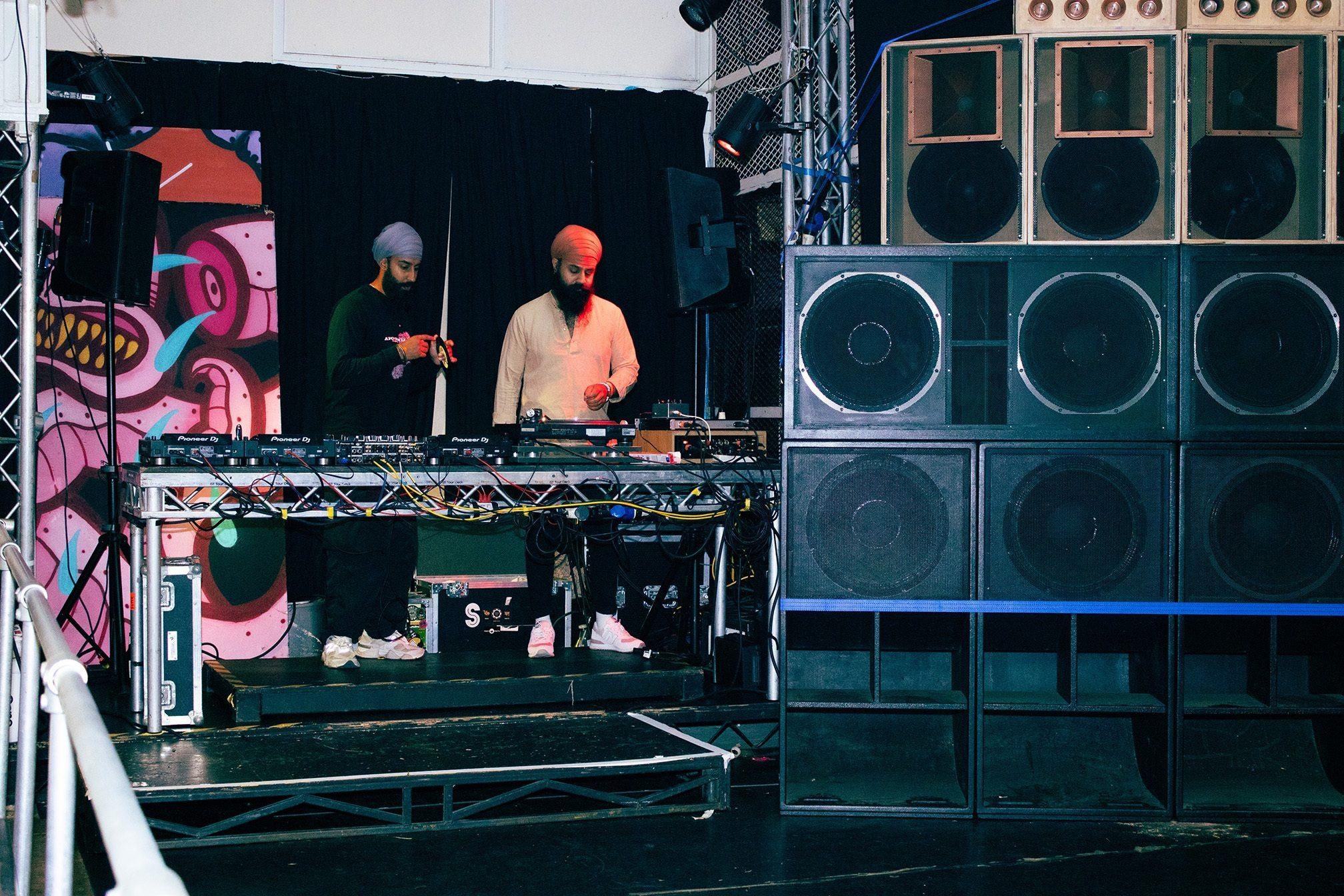
Southall is a place sprawling with culture and stories to be told at every corner. The town’s history provides evidence to British multiculturalism and communitarianism at its finest – something that modern society could learn a lot from. Whether it was the collective strength shown by the various diaspora situated in Southall during the volatile era in British history that was Thatcherism, or its modern-day championing of the Southall dub scene. Southall dub’s unique formulation came about due to Asian and Black youths sharing music culture simultaneously to their shared battle against discrimination in the past few decades. Whoever all those years ago unearthed the complementary nature of dhol beats and Bhangra, with reggae, dub and more, deserves their flowers; you created something special.
Knowledge is power and sitting down to hear the insights of Rani Kaur, AKA DJ Radical Sista, helped provide illumination into the South Asian experience within the music industry. The term is often used too frequently, but Rani is truly a trailblazer. Go find an Oxford Dictionary, search for the term, and lo and behold, there she is. A picture of the campaigning activist, turned partygoer, turned DJ. Describing the story of Asian culture in the midst of the 1980s, Rani was pivotal in the ‘Daytimer’ events that were common across the various South Asian hubs across the country – think Southall, Bradford, Handsworth. Serving as a space for British Asians to convene and listen to many coveted Bhangra records with infusions of UK club-focused tracks, DJ Radical Sista explained how the ‘Daytimer’ tag spawned from the nature of the party. With many venues simply not wanting Asian promoters running night-time events, the youth of the Desi diaspora got creative. Organising day-parties that would often see these teens and young adults sneaking out of school or the household during the daytime, it gave a sense of freedom and belonging to those who throughout the ’70s and ’80s were experiencing the height of UK racial tensions. You would not be amiss to think Rani was narrating the post-Brexit experience of South Asians - the similarities are alarming.
Read this next: “It’s a family affair”: South Asian clubbers share what the dancefloor means to them
As Rani and Dhruva discussed many different faces of prejudice she has experienced across her tenure as DJ Radical Sista, the crowd were engrossed in every insight. Heads nodding in agreement, it seemed that Rani’s story was one of shared experience across the room. The prejudiced views of men, venues, and general society that, as an individual from the Indian subcontinent, this was not for you, we do not want you here. Rani’s narration of her activism and fight for respect should serve as inspiration and hope to all Desi individuals in Britain right now, but conversely highlight to individuals from the various demographics that make up the United Kingdom that fundamental societal change is still on the agenda, despite the bravery of individuals such as Rani who have led the fight. However, let’s not be overly nihilistic here. With the right education that creates an understanding of British exploits over history while simultaneously celebrating the various microcosmic successes of British multiculturalism such as Southall, perhaps, as Bob Sinclair famously said, we could ‘be the love generation’. Time will tell, but I urge all to do their bit just by simply reading, listening, and beginning to resonate with the issues that have plagued us. Rani’s story is a great place to start.
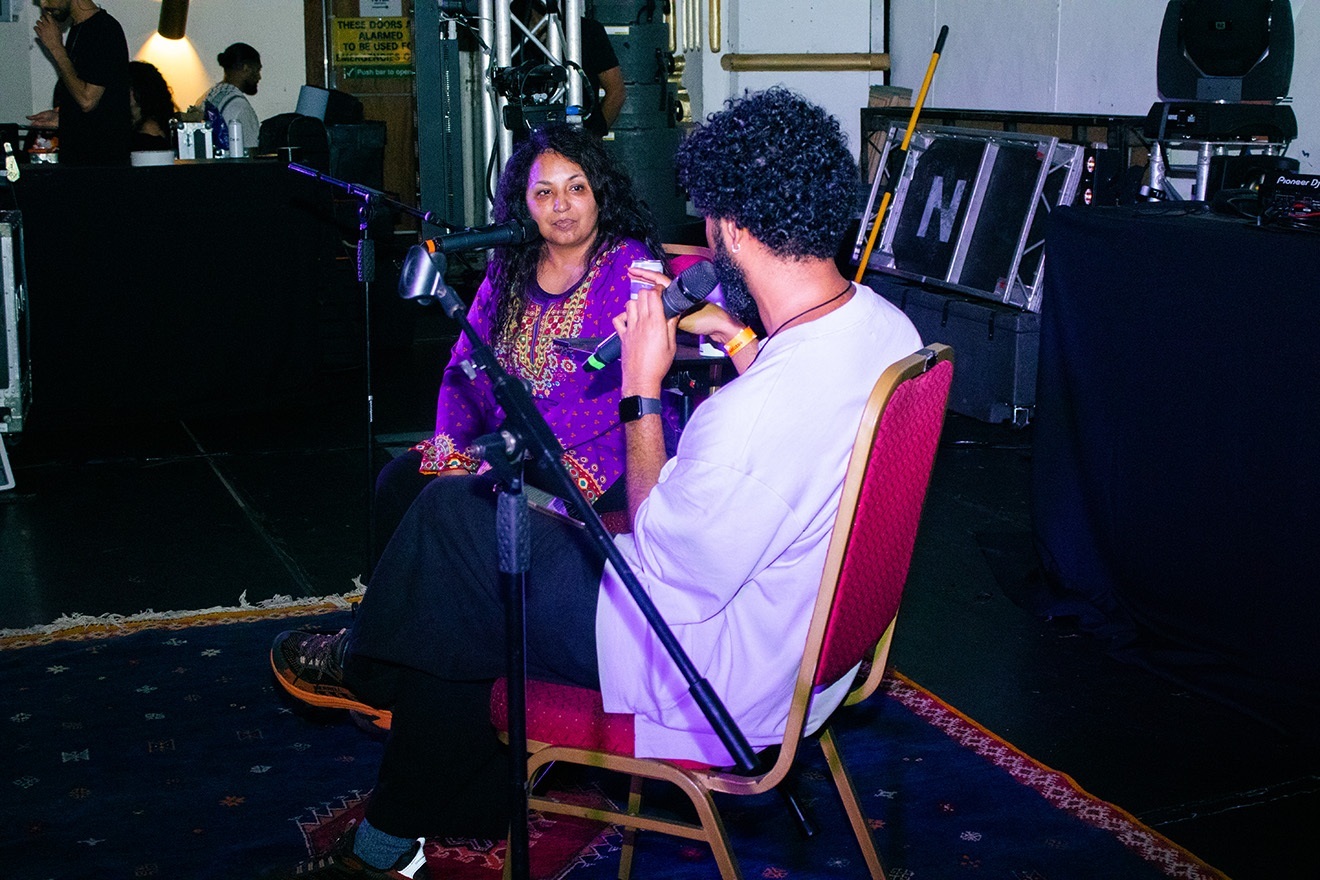
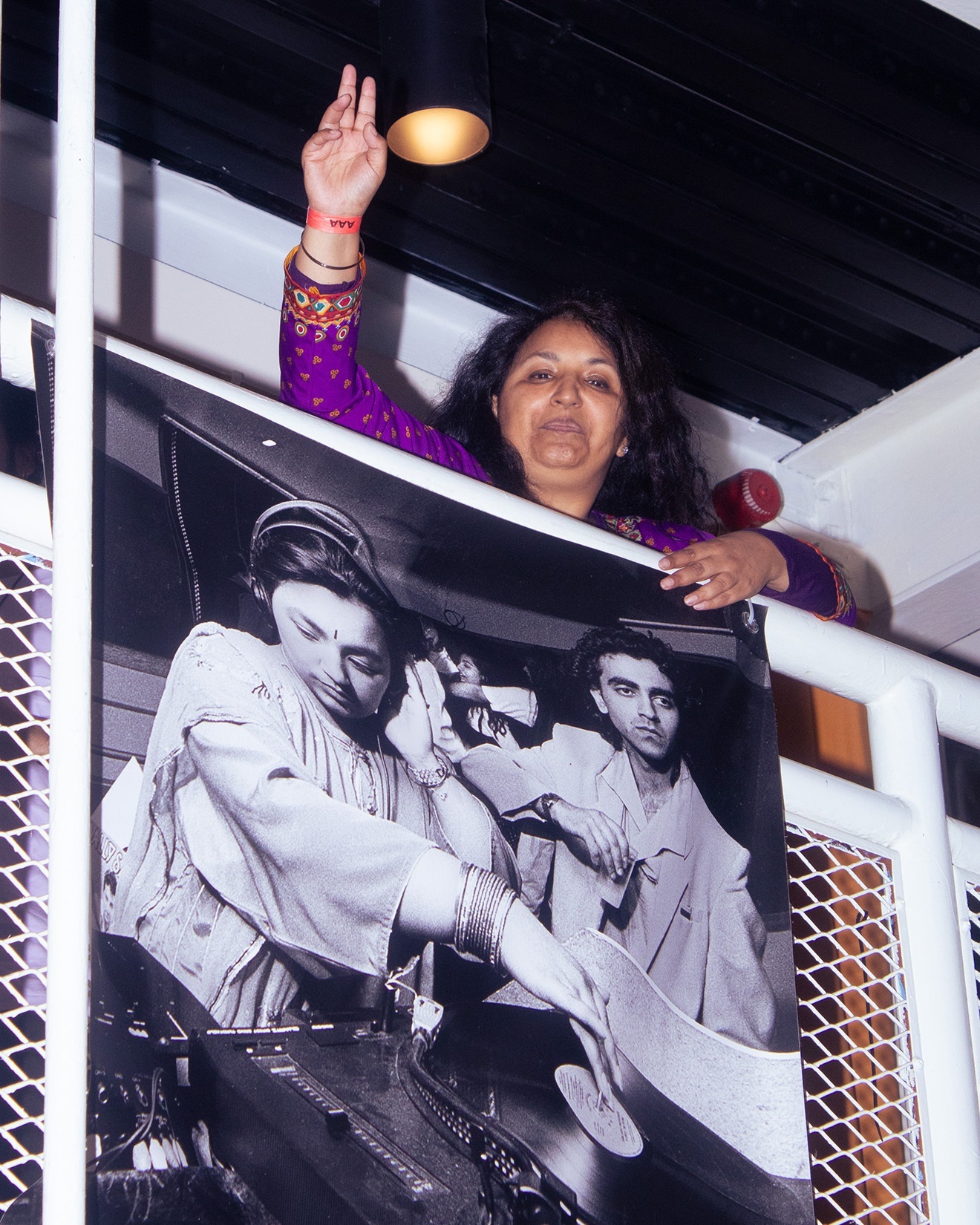
Following DJ Radical Sista’s conversation with Dhruva Balram, you could feel a shift in atmosphere, and hear a change in the tempo. Perhaps inspired by a true trailblazer within our community, many contemporary pioneers of South Asian club sounds were subsequently on display, and they decided to showcase what the diaspora is all about.
Read this next: 14 photos of Arrivals, Glastonbury’s first-ever South Asian dedicated stage
Arthi proved it is really a ‘Brat’ summer when she dropped Charli XCX’s ‘365’ during the height of her ever-infectious selections, which spanned UK funky, dancehall, and everything to make the aunties go wild. Dialled In seemingly draws this choice of selection out of individuals, as Arthi corroborated when she told Mixmag “it’s always such an open-minded, fun and kind crowd…for my set, I was the most experimental I have been in a while.” The infamous M.I.A anthem, ‘Paper Planes’, rang out onto the dancefloor. At face value, it's a hedonistic song that is unedifying in its content surrounding violence, drugs and consumption. However, that couldn’t be further from the truth, with the Sri Lankan Tamil star aiming to address, and mock, the xenophobic climate of the ’00s surrounding the South Asian diaspora and beyond — an attitude that sadly prevails in contemporary political rhetoric of Western nations surrounding immigration. The modern classic echoed across the Theatre with Arthi’s captivating energy disseminating to the crowd. The Rinse FM resident exclaimed, “I’ve since seen them go from strength to strength and I feel like I’ve grown as an artist alongside them, so Dialled In will always be special to me”.
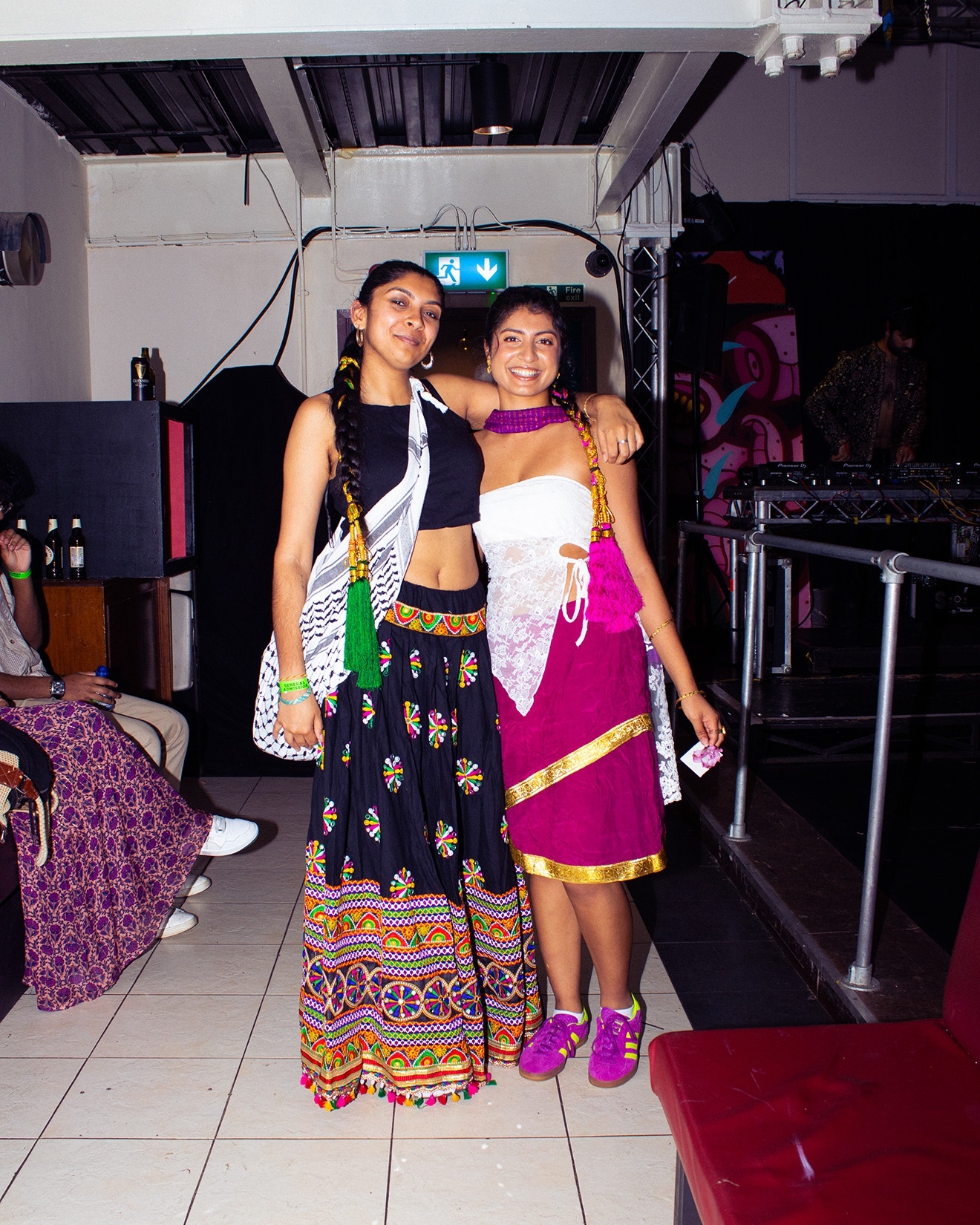
After three beautiful experiences, and a pit-stop fuelled by Dishoom and Sanskruti, I was eager for a dance. It is no secret that Dialled In co-founder Ahad Elley, commonly known as Ahadadream, is one of the hottest acts within electronic dance music at the present moment. The Foyer was duly heaving with individuals looking for that cathartic release, and boy did they get it, with Ahadadream serving up one hour full of energy and international flavours. The interpolation of Bhangra alongside his usual leftfield selection was seamless, topped off through a road-test of an upcoming collaboration with Nikki Nair that asserts the international reach of South Asia and its diaspora within electronic music is now undeniable for all to see.
Read this next: Mindful connection: Baalti are the Californian duo shifting perceptions on South Asian sounds
G33 was accompanied by Manchester’s favourite son, Chunky, and the pair came ready for war. The usual blend of Desi flavours came alongside the best selection displayed across the event, with a heavy grime and UK bass focus. Hearing the first few bars of Ruff Sqwad’s ‘Pied Piper’ through the Vedic Roots Soundsystem transported me to another realm for the next hour. Suddenly, I found myself in East London in the early ’00s. Tinchy Stryder to my left, Kano to the right, Jammer holding the fort. Place Chunky in that era and he would go bar-for-bar with those greats, considering the form he displayed all night. G33 closing on Imran Khan’s ‘Amplifier’ takes me on a trip down memory lane, harking back to days where my dad would have BBC Asian Network obnoxiously blaring out of his compact, wind-up radio while landscaping our back garden. With Gracie T joining forces with Metz n Trix, Manara, Jameela, and the astounding Pxssy Palace staling the show, dancers were bouncing between rooms to fully appreciate the momentous occasion.
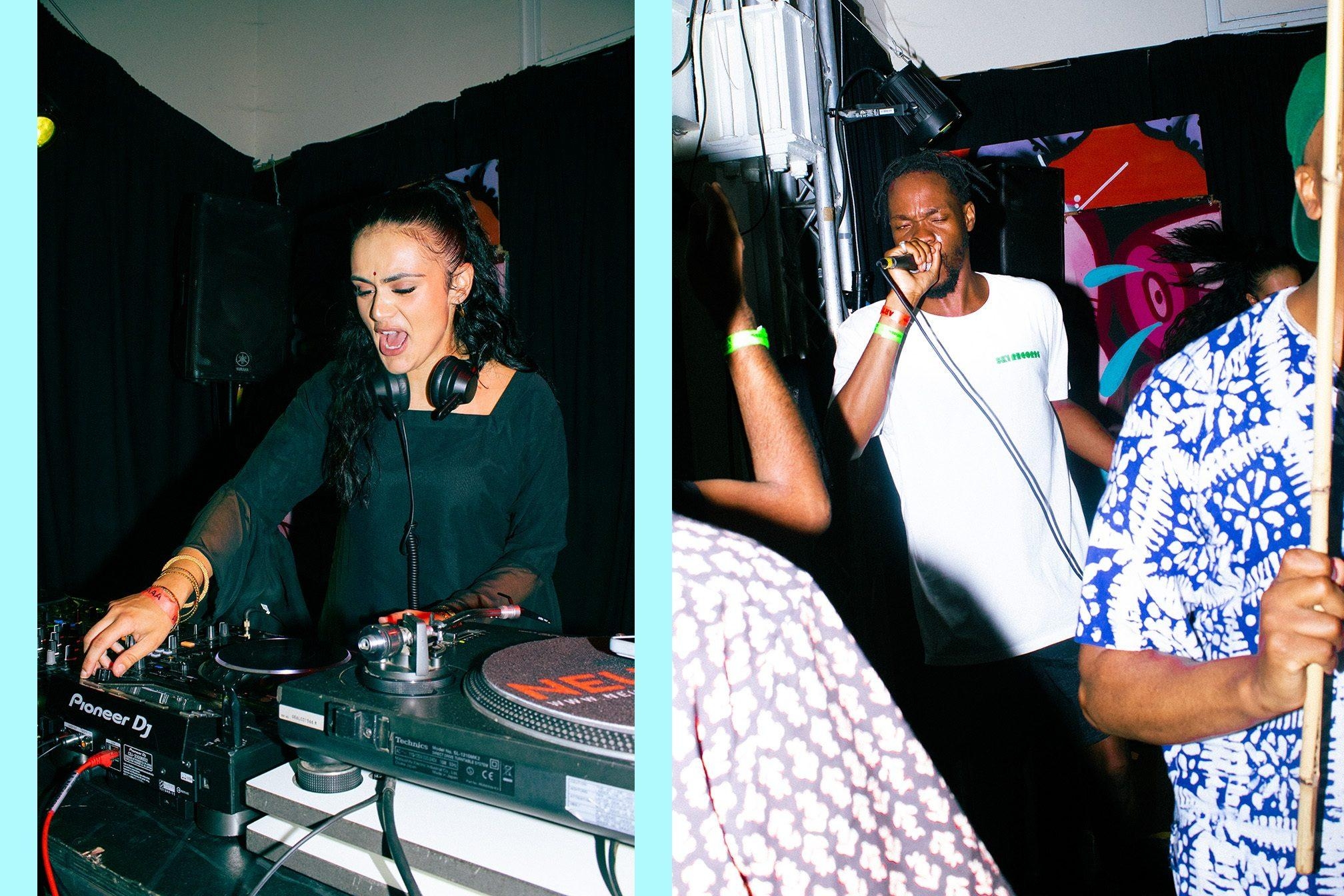
Perhaps the only dampener on the night could be the Bell Room. Despite the incredible selections found by individuals like Harpriya, Korzi, and more, the room felt detached from Theatre and Foyer, as it was situated two floors above. However, the additional platforming of South Asian talent cannot be slated. There was also a literal damper on the night, when the heavens opened, though it provided some refreshment for all that those stepping out after being camped out inside. An adept ending to the night back indoors saw Chandé and Mr. Scruff display the breadth of their selections, with Chunky conducting the crowd once again. Mr. Scruff is undoubtedly a Manchester legend, and going B2B with Chandé, the night was closed out with high-paced percussive selections. Solidarity with Palestine was displayed throughout, but the crowning moment came as in the closing minutes with chants of “End The Occupation Now!” led by Chunky and Nuradin Adbi, accompanied by the Palestinian flag gliding across the front of the stage.
Normally there is not much I believe Skrillex and I would find consensus on, but after the California-based superstar deemed Dialled In as “one of the most inspiring events I’ve ever been to” – Sonny, I think you and I would get on very well. Speaking from a place of personal introspection, life within the creative arts never felt available or even natural to myself. From the various barriers to entry or the ‘natural’ career path of the logical, binary professions for the South Asian diaspora, it is a story too well told. However, with the momentum being generated by organisations such as Dialled In and the Daytimers crew, it seems as if history could be rewritten in front of our very eyes. This unquantifiable feeling that events such as Dialled In can provide is invaluable and must not be understated.
For a moment, I want you to think back to Dhruva Balram’s words surrounding ‘power’ within the arts, it should not be construed as something of malicious intent. Afro-Feminist author, Minna Salami, recently coined the term ‘Exousiance’. The idea looks to celebrate ‘power’ as a life-affirming and inclusive force, in contrast to the often coercive nature that the word has often been associated with — think a bottom-up force instead of top-down. With Dialled In elevating diverse South Asian voices in the arts and challenging the traditional hierarchies, a space is conceived where artistry and community thrives in mutual respect, education, and collaboration. Often, we are told to ‘be the change we wish to see in the world’, and through the experience of a space such as Dialled In that is grounded in synergy, celebration, and unity, perhaps there is a beacon of hope during the fever dream of a year that is 2024. A year that marks a key conjuncture in UK society, for good and for bad, but long may the Desi diaspora keep championing our beautiful homelands.
Dialled In is in London on September 7 at The Cause, get tickets here
Indy Gill is a freelance writer, follow him on Instagram


